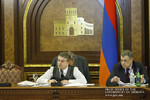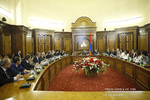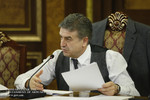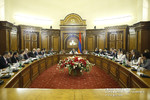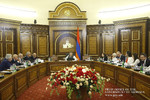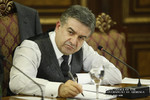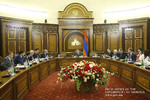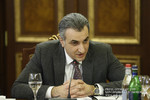Tuesday, 31 January 2017
Prime Minister underscores the need to clearly and precisely formulate priorities for 2017
Chaired by Prime Minister Karen Karapetyan, the Government continued discussing public agency performance reports for 2016, including their compliance with the government’s action plan for 2016, priorities and assessed performance.
Reports were delivered by the following entities: Ministry of Education and Science, Ministry of Agriculture, Ministry of Territorial Administration and Development, Ministry of Transport, Communications and Information Technologies, State Committee on Science, State Food Security Service.
Minister of Education and Science Levon Mkrtchyan reported that under the Improved Education program, 24 primary schools were founded in Armavir, Tavush and Lori Marzes covering some 750 children and 55 trained mentors.
The Government approved the introduction of a national program referred to as Ararat Baccalaureate program under the Educational Excellence national program in regional secondary educational institutions. 5 non-profit organizations with the status of a state university were reorganized into foundations, and 3 state universities have received institutional accreditation for 4 years.
6 universities implemented projects in the framework of the Competitive Innovation Fund. Referring 2017 priority issues, Levon Mkrtchyan noted that they were intended to carry out radical reforms in higher education system.
The Prime Minister noted that the Ministry’s team is expected to do extensive work in 2017. Karen Karapetyan attached importance to the assessment of the effectiveness of programs implemented by means of credits and instructed to submit brief information about them. “You are the most important link in the State. Your task is to work effectively and work with industry to solve your problems. We are spending less money on science, education, healthcare and other areas than it seems to be necessary for modern and civilized people, but at the same time we do not spend effectively. The amount spent and the results are inconsistent, we spend more than we get,” Karen Karapetyan said, stressing the importance of spending and redistribution functions.
***
Agriculture Minister Ignatius Arakelyan reported that work was carried out to solve priority problems in 2016. H noted that a number of measures were implemented to improve food security, develop various sectors, use arable land intended to improve the situation with subsidized fertilizers, seeds and diesel fuel, as well as provide advice. Referring to the programs intended for 2017, the Minister said it is planned to review the fertilizer subsidy program, considering that open tenders will lead to lower prices.
Karen Karapetyan inquired about the works carried out for the training of farmers and cooperatives. Deputy Minister of Agriculture Robert Makaryan reported that there are 317 thousand farms, 52 agricultural cooperatives, most of which are pasture user cooperatives.
The Prime Minister stressed the need for clear formulation of plans in this regard. “You should state clearly how many farms you want to have in 2017. That is to be the main driving force. We need to raise successful businessmen in order to show that people can make money in agriculture.”
The Prime Minister stated those priorities, based on which the agricultural sector may develop - digitization and capitalization, subsidy targeting, machinery and successful farmers. “Subsidy should go those entities having specific logic. Another issue is how to support them. The business entity cannot be blamed for not being an agriculture professor. I want you to formulate a relevant philosophy,” the Head of Government emphasized.
Mechanization should be carried out after digitalization in order to calculate how much money is spent on manually or incomplete works, and hence estimate the service market demand, the return on investment, the capital necessary for investments and the form of business organization. The Prime Minister instructed those responsible to abide by this logic in implementing the priorities and actions set for 2017.
***
Minister of Territorial Administration and Development Davit Lokyan noted that the Government has approved the regional development strategy for 2016-2025, which is designed to increase the competitiveness in the provinces and address socio-economic disparities between the regions. As a result of the implementation of the framework of cooperation with the EU started in the 7 pilot regional development projects, worth around 10 million euros. The Government approved a development strategy for the solid waste management system in 2017-2036.
The methodology for the development and management of five-year development plans has been improved. As of January 10, 2017, about 625 community councils had approved five-year development plans for communities. A methodology has been developed for the preparation of municipal budgets.
Coming to 2017 priorities, Mr. Lokyan said this year efforts will be made to develop strategies for regional development, hand over the management of various services to the private sector and streamline the waste management process.
Communities have been tasked to achieve a 20 percent rise in annual budgets in 2017 and further clarify the distribution of funds. Regional and rural development programs shall be implemented by the European Union. Investment projects will be implemented within the framework of the administrative reform program.
Prime Minister Karapetyan attached importance to the establishment of an analytical group of territorial administration, which is to digitize the subjects in territorial administration, clarify the functions of governors, balance responsibility and duties. “You need to closely work with Marz governors on the implementation of community development programs. Community champions have to be selected and assisted in every way. We have to create a new approach to territorial management in order to have a distinct business, pragmatic, logical plan for each region and for communities by the end of this year,” the Premier said, adding that it is necessary to develop a government policy for border communities, address the existing problems and provide jobs.
***
Transport, Communications and IT Minister Vahan Martirosyan reported that several projects aimed at improving transportations, roads and the lifeline road network were implemented in the year under review. Underway is the North-South Road Corridor program. In the railway sector, the T-3 level electric train was commissioned and pilot multimodal shipments from Europe to Iran via Armenia were launched in 2016.
A new frequency distribution chart in the field of communications and information technologies was prepared in the period under review. Efforts are underway to work out a legislative reform package and strategic plans to promote the ICT sector in partnership with the private sector.
Referring 2017 priority issues, Vahan Martirosyan reported that work on creating a common route network kicked off in 2016 to be continued into 2017, which aims to ensure the possibility of free movement of people. Having probed into the reasons behind the lack of regional passenger services between communities, the Ministry will take steps to address the issue.







